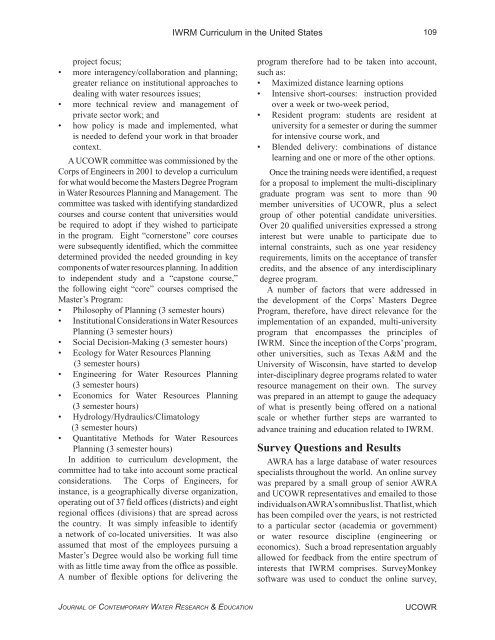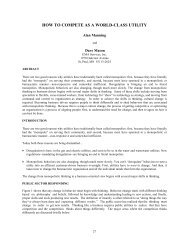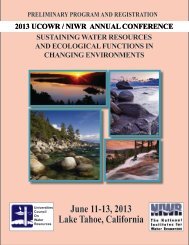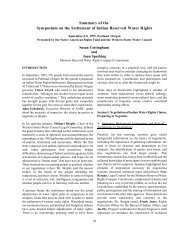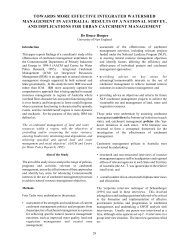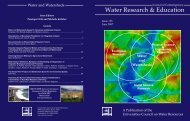108BourgetWorks Planner Capability Task Force Report,Corps Headquarters tasked its Institute for <strong>Water</strong>Resources (IWR), in collaboration with UCOWR,to develop an educational training program tomeet the needs <strong>of</strong> future leaders in the Corps. Thechallenge at the time was tw<strong>of</strong>old:1. Expectations <strong>of</strong> a loss <strong>of</strong> 35 percent <strong>of</strong> the Corps’planning leadership expected due to retirementsor promotions produced an immediate need toeducate existing employees.2. The new water resources challenges faced bythe Corps required leaders to have a strongmulti-disciplinary educational foundation.A joint committee <strong>of</strong> Corps personnel <strong>and</strong>representatives from UCOWR developed a multidisciplinarygraduate curriculum to meet thetask force objectives. The curriculum includedrequirements in hydrology, ecology, socialsciences (specifically, public policy, political <strong>and</strong>social decision-making <strong>and</strong> resource economics),engineering, history <strong>and</strong> law. The program wasfully endorsed by a joint Corps-UCOWR focusgroup in Dallas, Texas, in 2001 <strong>and</strong> at the UCOWRannual conference.Five universities 1 were subsequently identifiedto participate in the program <strong>and</strong> each one hasinvested substantial time <strong>and</strong> effort over the pastfour years to devise a flexible approach that ispractical <strong>and</strong> addresses the training needs <strong>of</strong> theplanning community. Unfortunately, trainingfunds within the Corps have been dramaticallycurtailed resulting in a minimal number <strong>of</strong> studentsparticipating in the program. Additional steps,therefore, had to be identified to bolster broaderinterest in multi-disciplinary training, including:• An expansion <strong>of</strong> the program to focus on thebroad principles that define IWRM;• The involvement <strong>of</strong> more universities thatare well suited to address both regional <strong>and</strong>national issues, as well as multi-disciplinarytraining tracts;• The establishment <strong>of</strong> a partnered program thatinvolves other federal <strong>and</strong> state agencies <strong>and</strong>related pr<strong>of</strong>essional organizations; <strong>and</strong>• The advancement <strong>of</strong> distance learning optionsthat are tailored to meet the needs <strong>of</strong> waterresources practitioners.The Corps <strong>of</strong> Engineers was interested inproviding its employees with the opportunity toobtain a graduate-level degree in water resourcesplanning as part <strong>of</strong> a program <strong>of</strong> incentives toencourage the hiring <strong>and</strong> retention <strong>of</strong> a topqualityworkforce. The multi-objective nature<strong>of</strong> water resource projects, combined with theneed to promote public participation in theplanning process, further contribute to the needfor more cross-trained individuals. A practicaldegree program that builds on the principles <strong>of</strong>IWRM would help to address this void among thepr<strong>of</strong>ession, <strong>and</strong> specifically the loss to the Corps <strong>of</strong>Engineers.At the request <strong>of</strong> the Corps <strong>of</strong> Engineers, the UniversitiesCouncil on <strong>Water</strong> Resources (UCOWR)polled its member organizations regarding theavailability <strong>of</strong> water resources degree programs,<strong>and</strong> the interest <strong>of</strong> these institutions in participatingin a targeted graduate degree program. Based on asignificant positive response, the Corps requestedthat UCOWR form an academic advisory groupto help evaluate what a water resources planningcurriculum should contain, as well as how it mightbest be delivered.The focus for what would become the MastersDegree Program in <strong>Water</strong> Resources Planning<strong>and</strong> Management was to better equip planners tobe able to respond to 21 st century water resourceschallenges. The UCOWR committee concludedthat in order to respond effectively, a directedprogram should be configured to produce generalistplanners, as opposed to those who are morenarrowly specialized in one topic area. The courserequirements would need to be more analogous toa Masters <strong>of</strong> Business Administration degree ratherthan a Masters <strong>of</strong> Civil Engineering. The program,therefore, needed to be interdisciplinary in nature.Key assumptions about the future water resourcesplanning environment that were integrated into thecourse designs included:••••••a reduced emphasis on large-scale projects;more changes (rehabilitations/redesign) <strong>of</strong>existing projects to meet new needs;deauthorization/dismanteling <strong>of</strong> existingprojects;more planning to manage/optimize systemperformance;watersheds as a planning focal point;more issue/program focus versus individualUCOWRJOURNAL OF CONTEMPORARY WATER RESEARCH & EDUCATION
IWRM Curriculum in the United States109project focus;• more interagency/collaboration <strong>and</strong> planning;greater reliance on institutional approaches todealing with water resources issues;• more technical review <strong>and</strong> management <strong>of</strong>private sector work; <strong>and</strong>• how policy is made <strong>and</strong> implemented, whatis needed to defend your work in that broadercontext.A UCOWR committee was commissioned by theCorps <strong>of</strong> Engineers in 2001 to develop a curriculumfor what would become the Masters Degree Programin <strong>Water</strong> Resources Planning <strong>and</strong> Management. Thecommittee was tasked with identifying st<strong>and</strong>ardizedcourses <strong>and</strong> course content that universities wouldbe required to adopt if they wished to participatein the program. Eight “cornerstone” core courseswere subsequently identified, which the committeedetermined provided the needed grounding in keycomponents <strong>of</strong> water resources planning. In additionto independent study <strong>and</strong> a “capstone course,”the following eight “core” courses comprised theMaster’s Program:• Philosophy <strong>of</strong> Planning (3 semester hours)• Institutional Considerations in <strong>Water</strong> ResourcesPlanning (3 semester hours)• Social Decision-Making (3 semester hours)• Ecology for <strong>Water</strong> Resources Planning(3 semester hours)• Engineering for <strong>Water</strong> Resources Planning(3 semester hours)• Economics for <strong>Water</strong> Resources Planning(3 semester hours)• Hydrology/Hydraulics/Climatology(3 semester hours)• Quantitative Methods for <strong>Water</strong> ResourcesPlanning (3 semester hours)In addition to curriculum development, thecommittee had to take into account some practicalconsiderations. The Corps <strong>of</strong> Engineers, forinstance, is a geographically diverse organization,operating out <strong>of</strong> 37 field <strong>of</strong>fices (districts) <strong>and</strong> eightregional <strong>of</strong>fices (divisions) that are spread acrossthe country. It was simply infeasible to identifya network <strong>of</strong> co-located universities. It was alsoassumed that most <strong>of</strong> the employees pursuing aMaster’s Degree would also be working full timewith as little time away from the <strong>of</strong>fice as possible.A number <strong>of</strong> flexible options for delivering theprogram therefore had to be taken into account,such as:• Maximized distance learning options• Intensive short-courses: instruction providedover a week or two-week period,• Resident program: students are resident atuniversity for a semester or during the summerfor intensive course work, <strong>and</strong>• Blended delivery: combinations <strong>of</strong> distancelearning <strong>and</strong> one or more <strong>of</strong> the other options.Once the training needs were identified, a requestfor a proposal to implement the multi-disciplinarygraduate program was sent to more than 90member universities <strong>of</strong> UCOWR, plus a selectgroup <strong>of</strong> other potential c<strong>and</strong>idate universities.Over 20 qualified universities expressed a stronginterest but were unable to participate due tointernal constraints, such as one year residencyrequirements, limits on the acceptance <strong>of</strong> transfercredits, <strong>and</strong> the absence <strong>of</strong> any interdisciplinarydegree program.A number <strong>of</strong> factors that were addressed inthe development <strong>of</strong> the Corps’ Masters DegreeProgram, therefore, have direct relevance for theimplementation <strong>of</strong> an exp<strong>and</strong>ed, multi-universityprogram that encompasses the principles <strong>of</strong>IWRM. Since the inception <strong>of</strong> the Corps’ program,other universities, such as Texas A&M <strong>and</strong> theUniversity <strong>of</strong> Wisconsin, have started to developinter-disciplinary degree programs related to waterresource management on their own. The surveywas prepared in an attempt to gauge the adequacy<strong>of</strong> what is presently being <strong>of</strong>fered on a nationalscale or whether further steps are warranted toadvance training <strong>and</strong> education related to IWRM.Survey Questions <strong>and</strong> ResultsAWRA has a large database <strong>of</strong> water resourcesspecialists throughout the world. An online surveywas prepared by a small group <strong>of</strong> senior AWRA<strong>and</strong> UCOWR representatives <strong>and</strong> emailed to thoseindividuals on AWRA’s omnibus list. That list, whichhas been compiled over the years, is not restrictedto a particular sector (academia or government)or water resource discipline (engineering oreconomics). Such a broad representation arguablyallowed for feedback from the entire spectrum <strong>of</strong>interests that IWRM comprises. SurveyMonkeys<strong>of</strong>tware was used to conduct the online survey,JOURNAL OF CONTEMPORARY WATER RESEARCH & EDUCATIONUCOWR
- Page 3:
Journal of ContemporaryWater Resear
- Page 6 and 7:
2Bruce Hooperinstitutional, and tem
- Page 11 and 12:
IWRM: Governance, Best Practice, an
- Page 13 and 14:
IWRM: Defi nitions and Conceptual M
- Page 15 and 16:
IWRM: Defi nitions and Conceptual M
- Page 17 and 18:
IWRM: Defi nitions and Conceptual M
- Page 19:
IWRM: Defi nitions and Conceptual M
- Page 22 and 23:
18Cardwell. Cole, Cartwright, and M
- Page 24 and 25:
20Mostert26 water boards responsibl
- Page 26 and 27:
22MostertTable 1. Third National Wa
- Page 28 and 29:
24MostertImplementationThe ambitiou
- Page 30 and 31:
26MostertBiswas, A. K. 2004b. Respo
- Page 32 and 33:
28UNIVERSITIES COUNCIL ON WATER RES
- Page 34 and 35:
30Ashton, Turton, and Rouxresource
- Page 36 and 37:
32Ashton, Turton, and Rouxassumptio
- Page 38 and 39:
34Ashton, Turton, and RouxEffective
- Page 40 and 41:
36UNIVERSITIES COUNCIL ON WATER RES
- Page 42 and 43:
38Hussey and Doversin water policy
- Page 44 and 45:
40Hussey and Dovers1994 Council of
- Page 46 and 47:
42Hussey and Doversestablished Thes
- Page 48 and 49:
44Hussey and DoversTable 1. Typolog
- Page 50 and 51:
46Hussey and Doversassessment appro
- Page 52 and 53:
48Hussey and Doverspolicy goals.Bey
- Page 54 and 55:
50Hussey and DoversFrawley, K. 1994
- Page 56 and 57:
52Mitchelloften took three to four
- Page 58 and 59:
54Mitchelltree preservation plans;
- Page 60 and 61:
56UNIVERSITIES COUNCIL ON WATER RES
- Page 62 and 63: 58Genskow and Borna series of chall
- Page 64 and 65: 60Genskow and BornTable 1. Watershe
- Page 66 and 67: 62Genskow and Bornthe first Dungene
- Page 68 and 69: 64Genskow and BornWashington, DC.Ko
- Page 70 and 71: 66Green and Fernández-BilbaoWithin
- Page 72 and 73: 68Green and Fernández-Bilbaosubjec
- Page 74 and 75: 70Green and Fernández-Bilbaoinflue
- Page 76 and 77: 72Green and Fernández-BilbaoBerbel
- Page 78 and 79: 74UNIVERSITIES COUNCIL ON WATER RES
- Page 80 and 81: 76BallweberEstablish AdvisoryCommit
- Page 82 and 83: 78Ballweberattributes in others (Ch
- Page 84 and 85: 80UNIVERSITIES COUNCIL ON WATER RES
- Page 86 and 87: 82Barreiraand ground water. To this
- Page 88 and 89: 84Barreirawith other states for int
- Page 90 and 91: 86UNIVERSITIES COUNCIL ON WATER RES
- Page 92 and 93: 88Davis and ThrelfallResource Manag
- Page 94 and 95: 90Davis and ThrelfallTable 2. Thirt
- Page 96 and 97: 92Davis and Threlfallby regional an
- Page 98 and 99: 94Davis and Threlfallenforcement, a
- Page 100 and 101: 96Davis and Threlfallhusbandry prac
- Page 102 and 103: 98Davis and ThrelfallNew Zealand: T
- Page 104 and 105: 100UNIVERSITIES COUNCIL ON WATER RE
- Page 106 and 107: 102Lamoree and van SteenbergenIt is
- Page 108 and 109: 104Lamoree and van Steenbergenand n
- Page 110 and 111: 106Lamoree and van Steenbergeninter
- Page 114 and 115: 110Bourgetwith over 600 people resp
- Page 116 and 117: 112Bourgetgovernment’s intrusion
- Page 118 and 119: 114Bourget4.management, drought man
- Page 120 and 121: 116McKayFigure 1. The four paradigm
- Page 122 and 123: 118McKay4. Paradigm 4 (which commen
- Page 124 and 125: 120McKaythree main functions:1. ass
- Page 126 and 127: 122McKayState Implementation of the
- Page 128 and 129: 124McKayTable 2. Corporate governan
- Page 130 and 131: 126McKayFigure 4. Qu. 26 - The ESD
- Page 132 and 133: 128McKayFigure 7. Qu.93- This organ
- Page 134 and 135: 130McKayBrundtland Report. 1987. Ou
- Page 136 and 137: 132UCOWR BOARD OF DIRECTORS/COMMITT
- Page 138 and 139: 134BENEFITS OF UCOWR MEMBERSHIPThe
- Page 140 and 141: 136Past Issues of the Journal of Co
- Page 142 and 143: 138Academic Organizations Membershi
- Page 144 and 145: 140Individual Membership Applicatio
- Page 146 and 147: Universities Council on Water Resou
- Page 148: Integrated Water Resources Manageme


